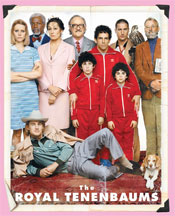It’s been just a couple weeks since the 10th anniversary of the 2001 release of The Royal Tenenbaums, Wes Anderson’s quirky-but-true depiction of family life. A dysfunctional family, perhaps, but then, aren’t we all?
If Romans 1 teaches us anything, it’s that we’ve all got a bit of knowledge in us somewhere. Knowledge of a God who saves, knowledge of a stain on the human soul. To be human is to know that one’s greatest problem is self-absorption. The immediate effect: separation. The long-term catastrophe: death. The other side of the coin says that the greatest longing of the human heart is to be redeemed, to be made acceptable, to be loved beyond degree.

When The Royal Tenenbaums released, some proclaimed it to be pretentious, overly involved and woefully unnecessary while others applauded the cinematography, gorgeous shot composition and riffs on the key of family dysfunction. So don’t bite the critics’ forbidden fruit just yet. A decade later, let’s take a moment to observe the echoes of Eden and glimpses of redemption this film brings to the table.
As the movie begins, we see director Anderson’s ideal of an untainted creation: three whiz kids surrounded by a stylized Manhattan. This is New York as dreamt up by a bookish 15-year-old who has fallen asleep with Salinger in his lap. Green Line Buses and Gypsy Cabs flitting through the streets. Everyone is a cosmopolitan: symmetrically coiffed and impeccably dressed, intellectually astute and financially secure. In the Andersonian world, life is best perceived on the rooftops of high-rises.
There’s Margot, the award-winning playwright; Chas, who can crunch numbers and predict financial trends with stunning accuracy; and Richie the “Baumer,” a tennis prodigy with the sweetest spirit of them all. Anderson’s snapshot of Eden, his take on untainted perfection, is composed of pre-adolescent wizardry. They are creators, innovators, champions of the world. The only thing standing in their way is a father who certainly must have an autographed copy of How to Ruin Your Children’s Lives Without Even Trying politely resting on his bedside table.
Royal Tenenbaum—played by Gene Hackman—is never painted as a monster. He’s witty, endearing and likable from the start. He still gets laughs when he shoots Chas dead-on with a BB gun after asking him to hold still, or even when he insists that Margot is his adopted daughter at every available occasion. He takes Richie to dogfights without a thought toward his other children. The BB that lodges itself in Chas’s hand stays there to adulthood. In fact, all three children spend their lives nursing wounds that cannot be undone. Royal’s constant infidelity leaves genius in ruins, angels robbed of innovative innocence. We are soiled and bent just as much by the sinfulness of others as by our own selfishness. And the closer the offending sinner is to home, the deeper the wound.
The wages of sin
As Royal returns home to fake a terminal illness, the viewer gets a chance to see the wages of sin cashed in on the silver screen. His children wear the same clothes they sported in their youth. Parental self-obsession bends its victims into a permanent state of childhood, minus the innocence.
The Reformers told us that the vice behind all vices was to be curved in on oneself, bringing about unmatched separation. Divorce is the bass note resonating under this symphony. It’s the heartbreaking theme of parent-child alienation that’s playing as a soloist throughout. Christ shows us God as a Father, giving flight to sparrows and ornamenting lilies. Richie’s pet hawk, Mordecai, is released to fly about New York at the film’s beginning. It mirrors the deepest unmet wish of these three kids: a caretaker who would nurture them until they were ready to be set free. But the nurturer was never there. They are all still caged, all still imprisoned in their father’s folly.

Story is said to be pointless if conflict is not resolved, if the protagonist doesn’t change. Royal is found out as a phony cancer patient and soliloquizes, “Look, I know I’m gonna be the bad guy on this one. But I just wanna say the last six days have been the best six days of probably my whole life.” Cue narration: “Immediately after making this statement, Royal realized that it was true.” The look of remorse on Hackman’s face is enough to convince the most hardened, hipster cynic that Royal’s heart must have grown three sizes that day. And heretofore we see redemption sing its tune.
The long-term effects of radical self-focus are death in oneself and others. While Royal faked his own last weeks, he failed to realize his own faulty fatherhood was killing everyone around him. Our own sinful nature is what drives us into the dust we came from, no doubt. But a father’s falsehoods accelerate the process far too efficiently.
In the midst of it all, Richie lives quietly in the company of creeping despair. Some things in his life cannot be attained. In the film’s most famous sequence, he shaves his beard, cuts his hair, and takes off his sunglasses. He simply cannot bear to stare into a face he has been hiding from for so long—a face scarred by heartbreak and stained by fear. So he slits his wrists with the music of Elliott Smith softly strumming along in the background.
At this point, Royal enlists himself in making things right once and for all. He takes Margot out for ice cream and can’t even remember her middle name, but it’s a start. She’s his daughter now, adopted on more than paper and into his unconditional love. He counsels Richie on his need to address his unrequited feelings with wisdom and realism. And Chas, who was so broken and angry, gets the most touching redemption scene of all. When the family beagle is hit and killed by a car, no sooner are they able to grieve than Royal is there with a Dalmatian in tow. As Chas thanks his father and strokes the new pup’s back, he chokes out, “We’ve had a rough year, Dad,” and the audience’s tears fall again. Here is salvation played out in cinema. When Royal finally passes on, it’s with Chas by his side and without a shred of resentment.

The Royal Tenenbaums portrays grace as it truly is. When Mordecai, Richie’s hawk, flies back at the film’s end, his feathers are slightly whitened; Richie’s not sure if it even is Mordecai at all. In reality, that’s because it was a different bird; the original hawk was kidnapped during shooting, but one cannot help but think this might have been some form of providence. It’s the new, grey-haired bird that offers the most true and beautiful evidence of a grace that resonates with real life.
At the end of it all, when salvation has its way, we cannot even be recognized as the same people. We bear marks and wounds we didn’t have before, certainly. But these are marks and wounds bathed in shining white, the death of a son and a Father whose heart beats along with his children’s.
Mack Hayden, a screenwriting major at Biola University, blogs his observations on life, literature, and film at http://after-word.typepad.com/.
Copyright © 2012 Christianity Today. Click for reprint information.











